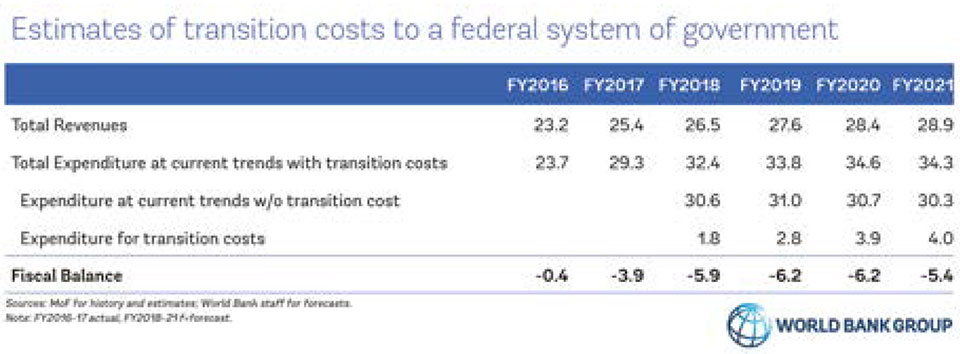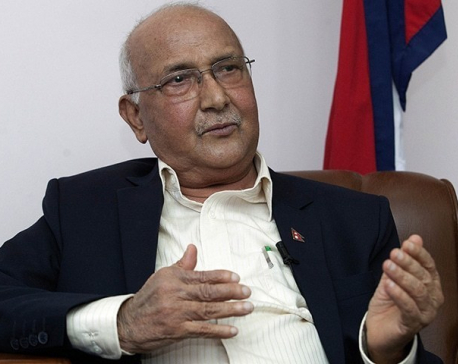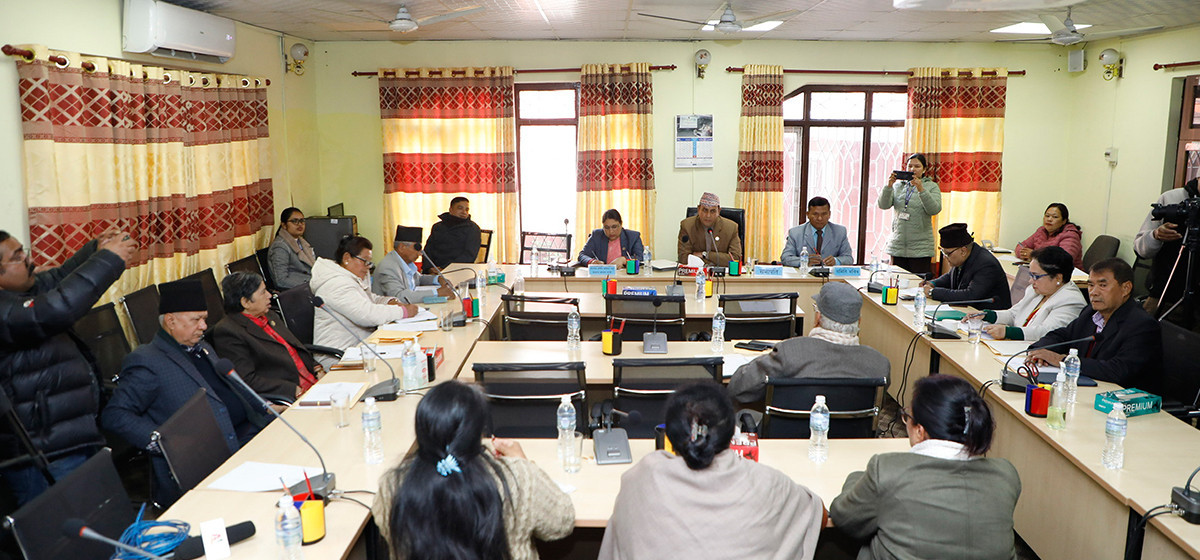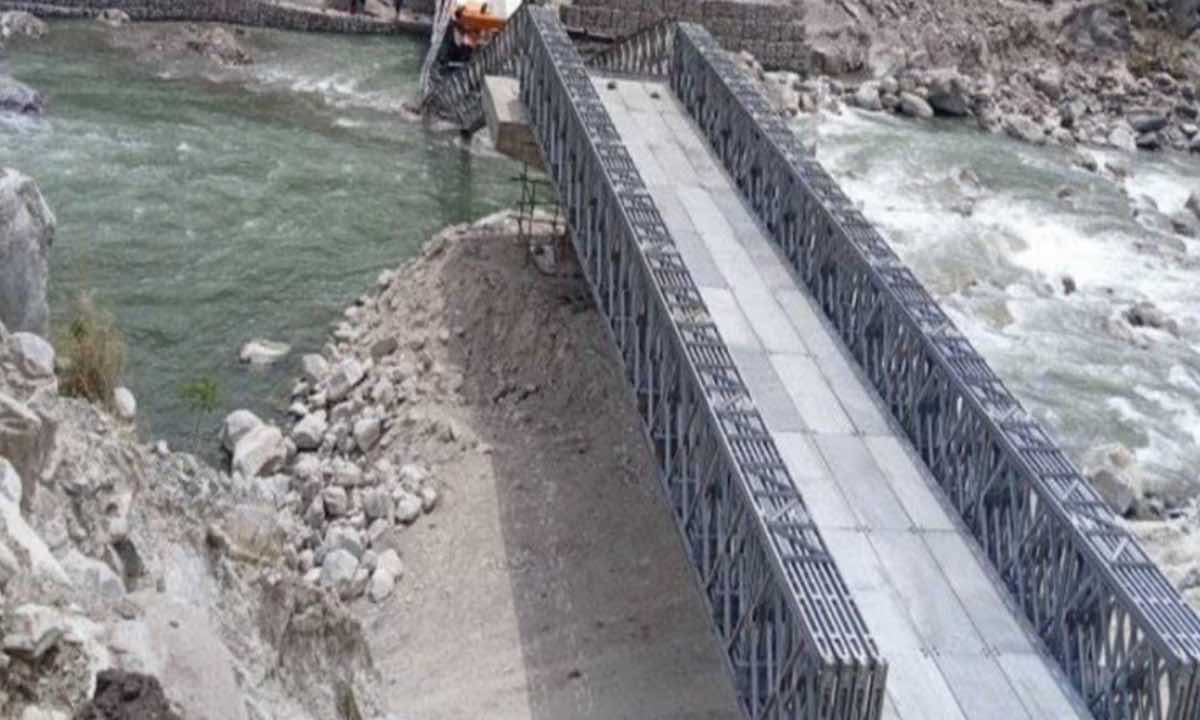
OR
Transition to federalism may cost 3-4% of GDP: WB
Published On: April 19, 2018 07:16 AM NPT By: Republica | @RepublicaNepal

KATHMANDU, April 19: The World Bank has estimated that the transition costs of restructuring the government in the new federal set up would be at 3-4 percent of GDP per year over the next four years.
Releasing the Nepal Development Update on Wednesday, the World Bank said that it anticipates the expenditure for transition costs to a federal system of government in the current fiscal year 2017/18 to remain at 1.8 percent of the GDP. According to the report, the costs for such transition could be 2.8 percent of the GDP in FY2018/19, 3.9 percent in FY2019/20 and 4 percent in FY2020/21.
Such estimates of the transition costs by the World Bank are based upon a number of assumptions, according to the report. One such assumption is that the consolidated wage bill of the overall government is not expected to change significantly.
Similarly, another assumption is that pending by sub-national governments, and fiscal transfers financing this spending, will grow gradually as the capacity of local and provincial government increases. The third assumption is that one-off establishment costs of sub-national governments will account for the bulk of additional spending needed.
“Should any of these assumptions not materialize, the estimates could be radically different,” the report noted.
The estimate of the World Bank about the transitional costs to the federal system comes in the wake of concerns that the new federal structures will put a significant financial pressure on the central government.
“Given the radical restructuring of the system of the government that Nepal is undertaking, it is to be expected that it will involve costs, as the new sub-national levels of government need to be built up while existing national and local levels require restructuring,” read the country update report.
However, the transition from a unitary to a federal system of government will invariably involve one-off costs.
Meanwhile, the World Bank has also cautioned the government to manage fiscal pressure resulting from increased cost, recommending two-pronged approach to manage the challenging path of federalism ahead. The World Bank update report recommends the government to revisit increases in spending over the last few years and eliminate wasteful spending and improve the efficiency of necessary and productive spending.
Highlighting the problems caused by the lack of a unified transition management plan as evident from the current fiscal year’s activities, another recommendation in the update report from the World Bank is for adoption and implementation of a time-bound plan to guide the transition process.
Though the central government has transferred Rs 150 billion to the sub-national governments, particularly to the local governments, by the first half of the current fiscal year out of the appropriated amount of Rs 225 billion, more than half of the transferred budget has remained unspent. This is mainly due to the confusion on functions of the new government units, lack of supporting legislation, and reluctance of civil service staff to go to the local level offices.
“A comprehensive transition plan and a responsible authority to oversee transition are needed,” read the report. “In the absence of a clear transition management plan, the implementation of the federal constitution in terms of devolution of funds, functions, and functionaries will be neither smooth nor well-sequenced,” the report added.
You May Like This

WB estimates transitional costs to federal structure at 3-4 percent of GDP
KATHMANDU, April 19: The World Bank has estimated that the transition costs of restructuring the government in the new federal... Read More...

Federalism should not mean more taxes!
The new federal government hiked tax rates on several consumer goods through the budget. Similarly, provincial and local governments are... Read More...

Reject or not to reject: CPN-UML in a Hamletian dilemma over federalism
It seems that the agenda of federalism has become a burden which the main Opposition CPN-UML is no longer interested... Read More...





Just In
- Gold price increases by Rs 700 per tola
- Fire destroys wheat crop in Kanchanpur, Kailali
- Bipin Joshi's family meets PM Dahal
- State Affairs and Good Governance Committee meeting today
- Gold items weighing over 1 kg found in Air India aircraft at TIA
- ACC Premier Cup semi-final: Nepal vs UAE
- Sindhupalchowk bus accident update: The dead identified, injured undergoing treatment
- Construction of bailey bridge over Bheri river along Bheri corridor reaches final stage













Leave A Comment